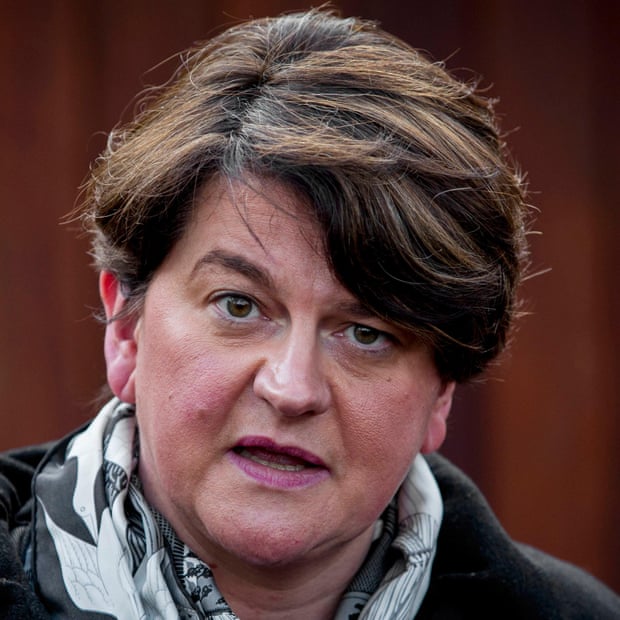Theresa May could lose a third vote on her Brexit plan even if the Democratic Unionists back it in the Commons, due to the number of Conservative rebels, a former DUP minister has predicted.
Amid a final scramble by the prime minister to bring her informal coalition partners onboard before a probable vote this week, Jim Wells, who was the DUP’s minister for health in the Northern Ireland assembly, said he believed up to 30 Tories would still vote against the plan.
“So even with the DUP support, I think it’s inevitable that Theresa May, if she pushes a third vote, will go to yet another defeat,” he told BBC Radio 4’s Today programme.
“The numbers just don’t stack up. While the DUP have an important role it’s not utterly crucial.”
While Wells is still listed by the DUP as one of its assembly members, he lost the whip last year after criticising the party leadership.
ProfileWho are the DUP?
Show

The Democratic Unionist Party (DUP) is a Northern Ireland unionist political party, founded by Ian Paisley in 1971. The party is currently led by Arlene Foster.
The DUP achieved their best ever general election performance in 2017, and have 10 of Northern Ireland’s 18 constituency MPs at Westminster, where they are led by Nigel Dodds. Since the election they have been supporting Theresa May’s Conservative government in a confidence-and-supply agreement.
The DUP supported leave in the EU referendum, and have repeatedly expressed their concerns over the provisions for an Irish border backstop. This led to them voting against Theresa May’s Withdrawal Agreement with the EU in parliament’s three ‘meaningful votes’. Getting them to back any new Boris Johnson Brexit plan for the island of Ireland is seen as key to him getting parliamentary backing for a deal.
Northern Ireland voted to remain in the EU.
Devolution and power-sharing in Northern Ireland, where the DUP had held the position of First Minister since 2007, collapsed in January 2017, and has not been restored despite several attempts, most recently in the wake of the murder of journalist Lyra McKee.
Martin Belam
Several prominent Brexiters, including the former work and pensions secretary Esther McVey, have said they are willing to switch their vote and support the deal, with government sources saying they hope DUP backing could create “a sense of momentum”.
But ministers insisted there would not be a third meaningful vote this week, before a crucial EU summit in Brussels on Thursday, unless May believed she could win it.
Jacob Rees-Mogg, who chairs the pro-Brexit European Research Group of Conservative MPs, said on Monday he would wait for the DUP’s verdict before deciding himself.
“No deal is better than a bad deal, but a bad deal is better than remaining in the European Union,” he told LBC radio. “Mrs May’s deal, however bad it is, means that we are legally outside the European Union.”
A number of prominent Conservative Brexiters, including Boris Johnson, are still holding out against May’s deal. The former foreign secretary argued that the Northern Ireland backstop, the main source of concern, “gives the EU an indefinite means of blackmail”.
In an article for the Daily Telegraph on Monday, he wrote: “If we agree this deal – and unless we have a radical change in our approach to the negotiations – we face an even greater humiliation in the second phase.
“We have not found a convincing unilateral way out of the backstop. Unless we discover some willingness to resist, the diet of capitulation seems set to continue for at least two years.”
Another sign of continued Conservative opposition came in a letter to the Telegraph from 23 backbenchers calling for a no-deal exit.
“‘No deal’ will prove to be the precursor to a very good deal indeed,” wrote the MPs, including former ministers Owen Paterson, John Redwood and David Jones. “Our moral course is clear: it is not our fault that we are confronted by two unacceptable choices, but it will be our fault if we cast a positive vote in favour of either for fear of the other.”
The security minister, Ben Wallace, told Today he would “strongly urge” Johnson and others to change their minds.
“I know Boris … is passionate about leaving the European Union,” Wallace said. “And if he is passionate about that, he will recognise that voting for this deal is the way to deliver Brexit, and the way to deliver leaving the EU.”
The former Northern Ireland first minister David Trimble said “substantive changes” had been made to limit the impact of the backstop.
In a joint paper for the Policy Exchange thinktank, Lord Trimble and the historian Paul Bew said the government was looking seriously at technological alternatives to the measure.
While “not a word” of May’s withdrawal agreement had been changed, the paper said, agreement in the Commons was closer. “A widespread war-weariness on all sides is a significant factor.”
However, Wells said the DUP remained undecided on whether the government had secured enough changes on the border insurance policy for the party’s MPs to back the deal.
“We still have a huge difficulty with the backstop, because we see it as a waiting room for constitutional change. We could find ourself locked in there for ever,” he said.
Amid speculation the party would be persuaded by pledges of extra funding for Northern Ireland, Wells insisted there was no “auction” taking place. “This is about protecting the constitutional future of an important part of the United Kingdom.”
